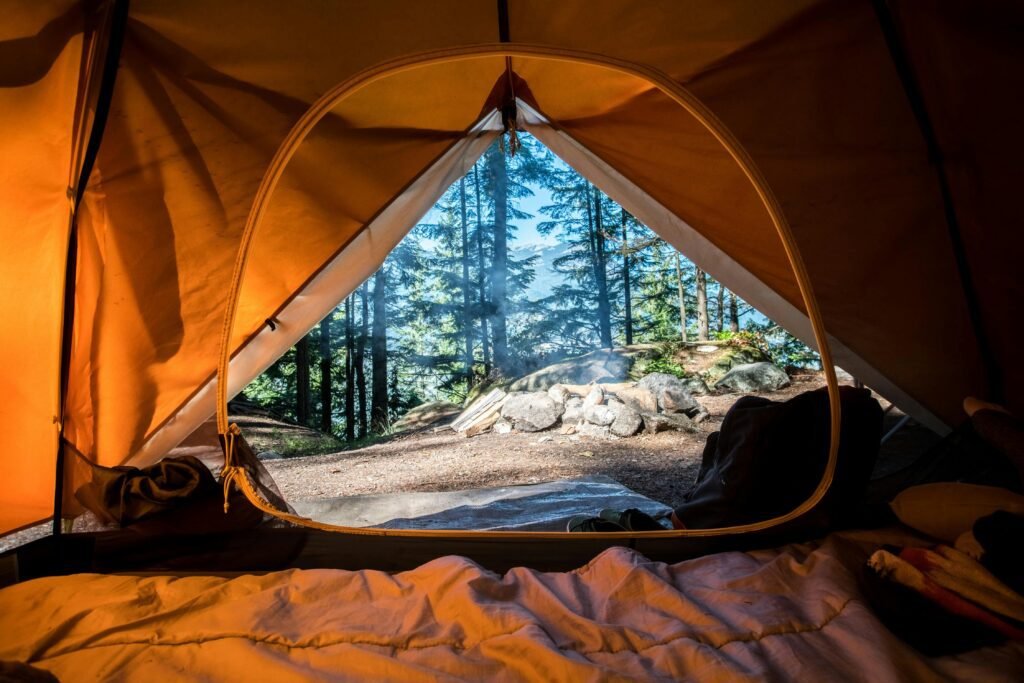

Camping in nature is a wonderful way to disconnect from the hustle and bustle of everyday life and immerse yourself in the beauty of the great outdoors. However, it is crucial that we approach camping with a mindset of responsibility and environmental awareness. By adopting sustainable practices and minimizing our impact on the environment, we can ensure that future generations can continue to enjoy the natural wonders around us. In this article, we will explore some practical tips on how you can camp responsibly and reduce your environmental footprint while still enjoying all the benefits camping has to offer.
Choosing a Campsite
When it comes to choosing a campsite, there are a few key considerations to keep in mind. First, think about the impact your presence will have on the area. Look for established campsites that already have a minimal impact on the environment. These sites are often marked with fire rings or designated spots for tents. By using these areas, you can help reduce the spread of impact and minimize damage to the surrounding ecosystem.
Another important factor to consider is the Leave No Trace principles for camping. These principles serve as guidelines for minimizing your impact on the environment and are based on seven core principles: plan ahead and prepare, travel and camp on durable surfaces, dispose of waste properly, leave what you find, minimize campfire impacts, respect wildlife, and be considerate of other visitors. By adhering to these principles, you can ensure that you leave the campsite as pristine as you found it.
Preparing and Packing
Preparing and packing the right gear is essential for a responsible camping experience. Make sure to bring the necessary camping essentials such as a tent, sleeping bag, cooking equipment, and appropriate clothing. Additionally, consider the sustainability of the gear you pack. Opt for eco-friendly options whenever possible, such as reusable water bottles, biodegradable toiletries, and gear made from sustainable materials.
To minimize waste and packaging, try to bring reusable containers and utensils. This way, you can reduce the amount of single-use plastic that ends up in landfills. Packing your own food in reusable containers not only reduces waste but also allows you to prepare and cook meals more efficiently, without relying on single-use packaging.


Campfire and Cooking
Campfires are a beloved tradition of camping, but it’s important to understand and follow laws and regulations regarding their use. Before starting a fire, check local regulations and any fire bans that may be in place. If campfires are permitted, always use established fire rings or fire pits. These designated areas are designed to contain the fire and minimize the impact on the surrounding environment.
When it comes to collecting firewood, do so responsibly. Avoid cutting down live trees and instead gather fallen branches and twigs from the ground. This helps maintain the natural balance of the area and ensures a sustainable supply of firewood for future campers. If possible, consider using a camp stove instead of an open fire for cooking. Camp stoves are more efficient and have less impact on the environment.
Waste Management
Proper waste management is crucial for minimizing environmental impact while camping. Follow the “pack it in, pack it out” principle, which means taking all your trash and waste with you when you leave. Leaving trash behind not only spoils the natural beauty of the campsite but can also harm wildlife and ecosystems. Bring plenty of garbage bags or containers to store your waste and ensure it’s properly sealed to prevent any leaks or odors.
When it comes to toiletries, opt for biodegradable options. Many brands offer biodegradable soaps, shampoos, and toothpaste that break down naturally in the environment. These products are a great alternative to non-biodegradable counterparts, which can harm water sources and wildlife if not disposed of properly.
If nature calls, make sure to bury human waste properly. Dig a hole at least 6-8 inches deep and at least 200 feet away from water sources, trails, and campsites. Cover the hole with soil when you’re finished and ensure it’s not visible or accessible to wildlife. Following these practices helps prevent contamination and ensures the health of both humans and the environment.


Respecting Wildlife
When camping, it’s important to respect and observe wildlife from a distance. Although it may be tempting to get closer for a better view or a photo, remember that it can have long-lasting negative effects on their behavior and habitat. Keep a safe distance and use binoculars or a zoom lens to admire animals without disturbing them.
Storing food securely is another way to minimize the impact on wildlife. Keep all food items in sealed containers or in bear-resistant food storage systems if you’re in bear country. This prevents animals from being attracted to your campsite and avoids potentially dangerous encounters. Additionally, always properly dispose of food waste. Leftover food and scraps should be sealed and packed out with your trash to avoid attracting wildlife.
Hiking and Trails
Hiking is often a highlight of any camping trip, and it’s important to do so responsibly. Stick to designated trails to avoid trampling on fragile vegetation and causing unnecessary erosion. By staying on established paths, you help preserve the natural beauty of the area and avoid damaging sensitive ecosystems.
Resist the temptation to take shortcuts or create new trails. These actions can lead to soil erosion and disrupt the natural flow of water, negatively impacting both the flora and fauna of the area. Instead, follow trail markers and signs to ensure you’re on the right path and to minimize any unnecessary damage.
Lastly, always respect trail closures and restrictions. These closures may be in place to protect wildlife habitats, preserve fragile ecosystems, or ensure public safety. Ignoring closures can result in fines and irreversible damage to the environment.


Water Sources
Water is essential when camping, but it’s important to minimize the impact on water sources. If possible, use lightweight water filters or purifiers to treat water from natural sources such as streams or lakes. This allows you to enjoy clean drinking water while reducing the need for single-use plastic water bottles.
Avoid washing dishes or clothes directly in water sources. Instead, use basins or buckets to collect water and dispose of wastewater in designated areas. This prevents contaminants from entering the water source and maintains the overall quality of the ecosystem.
Respecting Other Campers
Respecting other campers is crucial for fostering a positive camping experience for everyone involved. Keep noise levels low, particularly during quiet hours, to ensure a peaceful environment for all. Be mindful of your conversations and any loud activities that may disturb others.
Take measures to minimize light pollution as well. Turn off unnecessary lights and use low-intensity options whenever possible. By reducing light pollution, you not only provide a better camping experience for others but also allow for proper stargazing and a deeper connection with the natural world.
Lastly, when using communal spaces, such as picnic areas or shared bathrooms, leave them tidy for the next campers to enjoy. Clean up after yourself, dispose of trash properly, and avoid leaving any personal belongings behind. By taking care of shared spaces, we can all contribute to a more enjoyable camping experience for everyone.


Recreational Activities
Participating in recreational activities is a great way to enjoy the outdoors while camping responsibly. However, it’s important to follow the rules and regulations set in place. Whether it’s hiking, biking, fishing, or hunting, take the time to familiarize yourself with local regulations and any permits that may be required.
When engaging in recreational activities, try to use non-motorized equipment whenever possible. This helps minimize noise pollution, reduces fuel consumption, and allows for a more tranquil experience in nature. If boating or kayaking, remember to practice proper water safety and respect designated areas to protect sensitive habitats.
Be mindful of your surroundings and avoid damaging vegetation or wildlife habitats. Stick to established paths, avoid trampling on delicate plants, and refrain from disturbing animal dens or nesting sites. When fishing, be sure to abide by fishing regulations, such as catch limits and size restrictions, to ensure the sustainability of fish populations.
Teaching and Promoting Responsible Camping
One of the best ways to make a lasting impact is to educate others about responsible camping practices. Share your knowledge and experiences with friends, family, and fellow campers. Explain the importance of Leave No Trace principles and the benefits of minimizing our environmental impact while camping.
Consider participating in clean-up initiatives or volunteering with sustainable camping organizations. These initiatives often involve collecting litter, restoring trails, or educating the public about environmental conservation. By actively engaging in these activities, you can help make a tangible difference in preserving the natural beauty of our camping areas.
Additionally, promote sustainable camping organizations and initiatives through social media or by wearing clothing and using gear that supports environmentally conscious practices. Encourage others to join you in adopting responsible camping habits and highlight the positive impact it can have on our natural surroundings.
Remember, every small step you take towards responsible camping makes a difference. By choosing a campsite carefully, packing sustainably, managing waste thoughtfully, respecting wildlife, staying on designated trails, minimizing the impact on water sources, respecting other campers, and engaging responsibly in recreational activities, you can enjoy the great outdoors while leaving it better than you found it. Happy camping!


Leave a Reply